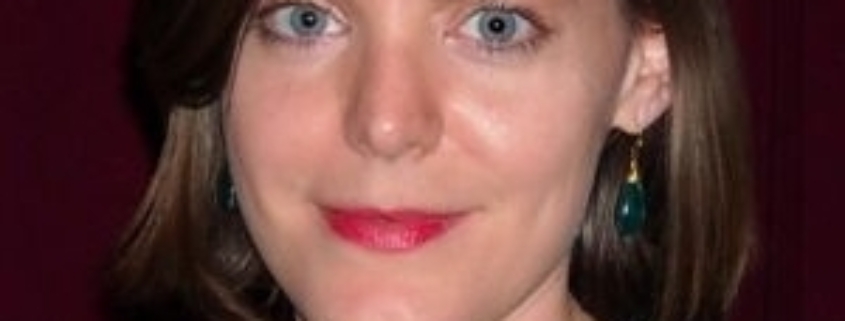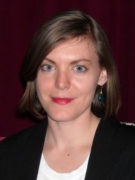Spotlight: It is leaving
1.
On the first day there was stillness.
For a moment nothing moved. The wind held its breath. The birds stopped in midflight—their wings pinned against the blurry space of sky.
We didn’t blink, as though our eyelids were glued back. Orators’ hands hovered in mid-gesticulation. Wheels of cars didn’t rotate. Midway through an intersection we could see the perfect, shiny forms of the hubcaps, each spoke a precise dart of light.
Clocks stopped. The clappers of church bells paused before banging the brass sides. Crowds stilled—arms and legs and necks craned in poses of motion.
After the stillness we moved again, and we almost forgot about this incident.
2.
People are always dying, but on the next day, there was a different sort of dying.
A woman at the Dollar Store collapsed as she shelved boxes of tampons. She was only 29. A man in an I-80 Westbound toll both (Exit 274) crumpled over, his hand held out for a ticket. The cars honked, and a red trickle of blood seeped in the gulley between his pinky and ring fingers.
Babies asphyxiated in cradles, bankers reached for their throats behind glass-plated offices. The weatherman’s eyes rolled into the back of his head, as a high front blew in on the green screen behind him.
The President declared an emergency, but he fell onto his desk in the middle of the announcement, and we all heard the crack his forehead made against the wood. Then a commercial for frozen pizzas came on.
It wasn’t only the people, but the animals, too.
Deer stood on the yellow centerlines and faced the grills of cars. Cats lunged through screen doors, their furry necks caught in the screens. A tiger at the San Diego Zoo leapt over its wall, and then lay in the center of the snake pit. And though to a flock of sixth-graders it looked like the tiger had fallen asleep, its striped ribs didn’t heave and the Egyptian cobra that snuck up between its ears didn’t make the tiger flinch.
We heard—through the one lone radio station—that a herd of elephants sunk into a watering hole in Zambia, and that llamas in Peru threw themselves from Machu Picchu.
We tried to stay in our homes and wore masks to protect our airways. We sprayed the air with disinfectants and carried pocket-sized bottles of hand sanitizer.
3.
Birds fell from the sky on the third day. Plunking onto rooftops, catching in their beloved tree branches, landing in the laps of unsuspecting pleasure-seekers hurtling along in the Coney Island Cyclone, one of the last rollercoasters still functioning.
Ostriches in Australia were reported to have stuck their heads in the sand, suffocating. Their backsides stuck up like the ends of feather dusters, sprinkled with the dry grit of the Outback.
Fish—limp and glassy-eyed—washed up into the moats of sandcastles. And when we gathered seashells, our fingers scraped against eels and, once, a mantaray spread out in defeat.
If we wanted to swim, we had to stroke past the floating carcasses of sharks, drifting like miniature islands.
We ate a feast of fowl and shellfish, after the health department proved that there was no disease. We stuffed our stomachs with seafood and broke wishbones, forgetting our wishes.
4.
A NASA astronomer, in Mississippi, noticed that the buckle on Orion’s belt was missing. He demanded that the telescope be cleaned.
An amateur astronomer—twelve years of age—reported that the stars of the Big Dipper had fallen one by one, until only the North Star loomed overhead. And then, with many of us watching the sky, it popped, with blackness replacing where it had been.
The moon wasn’t visible that night, until a San Francisco priestess pointed out that it was time for the half moon. Many phone lines were down, but once word got out, suburbs called in reporting that there was no moon in their night skies either.
The next morning was not a morning, for the sun burst into millions and billions and trillions of sparks that fizzled like pop rocks, and made our mouths ache.
The only light we had now was in candlewicks and flickering light bulbs, and fires made from brittle branches. We stared into the whitest parts of the flames and imagined being burned by the sun.
Some more dangerous types lay in tanning beds and took off their eyewear, so their eyeballs would be ablaze.
5.
We were frantic today.
The Redwoods gave up and toppled over. Cornstalks shriveled up in Iowa, oranges rotted in their skins down in Florida, the wheat of Kansas turned to dust and could no longer be gathered. There were no more cows for butter in France, the rice paddies of China flooded, and the Dutch tulip fields molted, the petals crackling underfoot.
Throughout the day the plants blanched, until green was just a memory.
We headed in droves (those of us left) to the grocery stores and bought cartloads of cereals and moldy breads, boxes of spaghetti and Oreos and frozen peas, because what if we no longer had the option to refuse peas?
The vegans turned cruel and beat back the meat eaters for the last stalks of broccoli, raising the green heads high up like bridal bouquets.
Earthquakes divided neighborhoods and cities and countries. We’d look out our windows to the houses next door, a deep chasm where the arborvitae used to be. One man’s house swelled up in the shape of meringue, and the ground on all sides crumbled like a graham cracker crust.
6.
We sat atop our roofs, because the rivers and estuaries had flooded.
The oceans swallowed New Zealand last hour, and this hour they swallowed California (which finally broke away with yesterday’s earthquake).
It rained heavily and no one could tell sky from land. We walked through a perpetual waterfall. The umbrellas drooped down past our ears, our snot mixing with the water, and when we were parched, we stuck out our tongues and caught raindrops.
One mother washed her laundry outside, but the only dry place left to hang it was the attic. The jeans began to mildew.
7.
Today our imaginations withered, and we forgot how to have conversations.
We huddled in fog. There were no shadows, because darkness receded from whence it came. We strived to hold onto a hand, a lamppost, a chimney, and our senses faded too.
We thought that It would leave like the great and wonderful Oz—in a balloon, soaring in a burst of rainbow color up into the clouds. Or maybe as a shooting star—fast and bright and magnificent—ducking between the galaxies. Or sharp and menacing like a missile—direct and out into space, orbiting us like a satellite and breaking away.
But we had never seen It. So we only felt It leaving, as in the way of fleeting thoughts.
And between the moment of Light and After Light, we reached for something, grasped onto nothing and in the pits of what might once have been called souls, recognized a great absence. We despaired.
At the end of the week, we were entirely alone.


 Courtney McDermott is a native of Iowa currently living in the greater Boston area. She is a graduate of Mount Holyoke College and the MFA program at the University of Notre Dame. Her debut collection of short stories, How They Spend Their Sundays, was published by Whitepoint Press in 2013. She now works at Harvard and can be found on
Courtney McDermott is a native of Iowa currently living in the greater Boston area. She is a graduate of Mount Holyoke College and the MFA program at the University of Notre Dame. Her debut collection of short stories, How They Spend Their Sundays, was published by Whitepoint Press in 2013. She now works at Harvard and can be found on 


